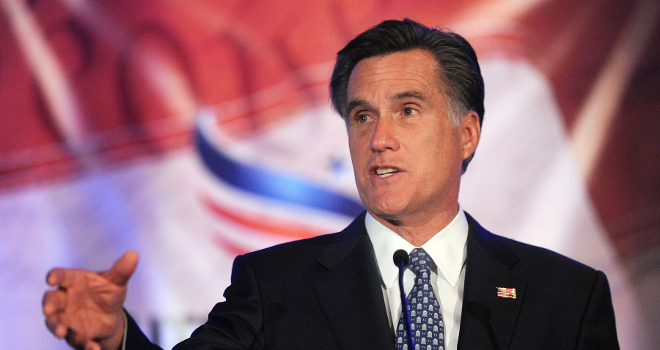Mitt Romney employed an elaborate telecommunications metaphor in his economic speech on Tuesday to criticize President Obama.
He began his speech by waving his own touchscreen phone in the air after waxing nostalgic about the days when you used to put a quarter in a payphone to make calls from the airport. Later, he returned to the theme in a major way.
“I mentioned a moment ago that we’re now using smartphones, not payphones,” he said. “President Obama’s strategy is a payphone strategy and we’re in a smartphone world. What he’s doing is taking quarters and stuffing them into the payphone and he can’t figure out why it isn’t working anymore. It’s not connected, Mr. President! Your payphone strategy does not work in a smartphone world.”
Romney used the speech to introduce his new economic plan, a 160-page white paper (available on Kindle) that his campaign boasts contains 59 specific proposals to boost growth.
He aggressively pitched his plan in his speech to middle class Americans, who he cited over and over in his remarks.
“It should be good to be in the middle class in America,” he said, adding that “the average American ought to have the highest income in the world.”
A key plank of his proposal is an overhaul of federal retraining for workers, saying he would introduce legislation to consolidate different education programs under one banner and block grant their funds to the states. He also aggressively called out China for costing America manufacturing jobs, accusing them of being “currency manipulators”
“”We’re not going to have a trade war,” he said, “but we’re not going to have a trade surrender either.”
Many of the ideas he offered are familiar enough for a Republican candidate: lowering the corporate tax rate to 25% and lowering individual rates, for example, while simplifying the tax code. He also suggested getting rid of the capital gains tax, which typically benefits the ultra-wealthy, but only for Americans making under $200,000 a year, to encourage personal investment and saving. While Romney did not pledge to make these tax cuts revenue neutral, he did rule out raising overall revenue by closing loopholes and eliminating various special breaks.
Romney’s book also takes continued ownership over his now-famous quote that “corporations are people” to defend lower taxes on business:.”Worries that a lower corporate tax rate are unfair or unaffordable are fundamentally misplaced,” his proposal reads. “The truth is, as Mitt Romney likes to say, ‘corporations are people.'”
Romney also suggested that any new costs from regulations be offset by repealing other regulations, an idea that’s actually been floated by Democratic Senator Mark Warner (D-VA). He cited a highly questionable study to make one of his most dramatic statements in his speech, however, a claim that government regulations cost $1.75 trillion a year. The Office of Management and Budget has aggressively challenged the research behind the claim while the nonpartisan Congressional Research Service reported to lawmakers that there were serious concerns with its methodology.









